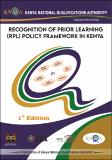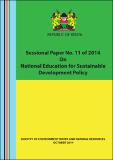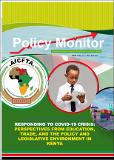| dc.description.abstract | The Recognition of Prior Learning (RPL) policy in Kenya is critical to the development of a responsive and equitable education and training system that facilitates access, mobility, progression and fair chances to the disadvantaged, discouraged and traditionally marginalized groups. The policy aims to recognize all persons who have acquired competency through informal and non-formal settings. The policy will therefore target different categories of individuals, learners or potential candidates in the society seeking access to certification and recognition of their competencies regardless of one’s educational background, age, status in society, disability, race, religion or nationality. Kenya has a youthful population with 75.1 % below 35 years of age (KNBS 2019). Some of these have acquired skills through apprenticeships, Jua Kali sectors, through training and most have perfected their skill but lack certification or recognition of their competences. Kenya’s socio-economic growth largely depends upon the effectiveness and quality of the country’s Human Resources Development (HRD) system. | en |



